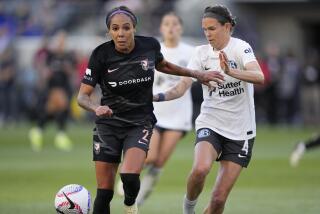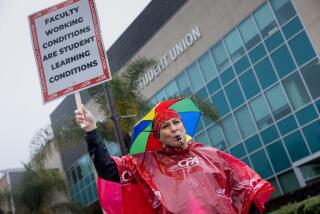NFL PREVIEW 1988 : A Year Later, NFL Management and Players’ Union Still Are Far Apart
Although the NFL players’ strike of 1987 died a swift and bitter death, the bickering and posturing between the union and league management live on.
At stake is a new collective bargaining agreement, the working contract between the NFL Players Assn. and the owners, represented by the NFL Management Council. Last season’s strike failed to produce a new agreement, so both sides have been following the terms of the former plan until a new one can be negotiated.
And there’s the rub. Neither side seems willing to budge on the fundamental differences.
The players, among other things, want the question of free agency resolved. They also want improvements in pension, medical and severance benefits.
The owners argue that true free agency would ruin the economic balance of the league. They also maintain that continued change in the free agency system could affect certain benefits, such as insurance provisions and severance and retirement payments.
Adding to the confusion is a U.S. District Court ruling in July that, although denying the players free agency now, indicated that if the union were to pursue the case in court, it would probably win. But that could take years, which is why the ruling also suggested that the union and management might be better served to solve their differences at the negotiating table.
Easier suggested than done. The Management Council says it would be happy to begin negotiations, just as long as the NFLPA knows that a significant change in the present free-agent system would place economic burdens on the league.
“Obviously, that would have an impact on other benefits,” said Jack Donlan, executive director of the council. “We have three choices: You don’t increase a benefit. You decrease it. Or you eliminate it.”
The alternative, Donlan said, is for the union to reopen bargaining sessions so a compromise can be reached. Otherwise, he said, free agency might cost union members more than they thought--specifically, a reduction in their other benefits. “And the players would probably not be particularly happy,” Donlan said.
The players aren’t particularly happy right now. First, there are the unpleasant memories of 1987, when players missed four games--and four paychecks--because of the strike. And almost a year later, a new agreement seems almost as distant as it did weeks before the walkout.
“Gene (Upshaw, NFLPA executive director) has always been willing to talk,” said Doug Allen, assistant executive director of the union. “But the bargaining table isn’t the destination, an agreement is. There has to be some indication that they’re willing to change their position.”
The union is confident of reaching a favorable agreement with the owners for several reasons, including another court ruling earlier this year regarding free agents that could cost management as much as $200 million, Allen said.
The NFLPA also is appealing several back-pay cases that, if overturned, would put more pressure on the owners. Add to that, Allen said, the league’s television contract, which expires after the 1989 season. “The networks want to see some demonstration that there will be peace,” he said.
Meanwhile, Donlan said the Management Council has the option of implementing its collective bargaining agreement proposal of 1987. Of course, if the union wasn’t happy with that very same proposal last year, it won’t be this year, either. “That’s why we say, ‘Isn’t it in your best interests to come to the bargaining table?’ ” he said.
Donlan said he expects that the players will pressure the union to begin negotiating. The union answers that no such mandate has been given. Whatever the case, Donlan has set a Feb. 1, 1989, deadline for a new bargaining agreement.
The league has gone without one in the past, from 1974 to 1977. As usual, no one knows how long it will take this time. “I don’t think anybody can predict that,” Allen said. “There are too many variables.”
And if either side is waiting for Commissioner Pete Rozelle to intervene, forget it. Rozelle made it clear during a recent conference call with reporters that he has no intention of involving himself in the collective bargaining process.
“I’ve talked to all parties off and on,” he said. “I think it can be done, but I think it’s very, very difficult, as you saw during the strike period. But I’m not directly taking part in it. It’s a function of the Management Council and the Players Assn.”
Rozelle said the only immediate major problem he could envision without an agreement would be the effect on league expansion.
“We said we’re ready to expand, but we’re not going to set it in motion until we have a collective bargaining agreement, “ he said. To do so, Rozelle added, would be “foolhardy.”
More to Read
Go beyond the scoreboard
Get the latest on L.A.'s teams in the daily Sports Report newsletter.
You may occasionally receive promotional content from the Los Angeles Times.










